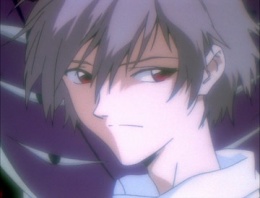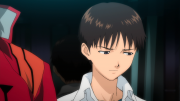Kaworu Nagisa

|
"The person in charge exists to take responsibility." |
| Kaworu Nagisa | |

| |
| 渚カヲル | |
| Age | 15 |
|---|---|
| Birthday | 09/13/2000 |
| Seiyū | Akira Ishida |
Kaworu Nagisa[1] (渚カヲル) is the Fifth Children and a replacement Eva pilot[2] sent to Nerv HQ by Seele. At the same time, he is the 17th and (supposedly) final Angel, designated "Tabris" (Arabic: تبريس), the only one to infiltrate Terminal Dogma.
Contents
Profile
Although classified as an Angel, Kaworu is similar to Rei Ayanami in being a Seed of Life inhabiting a human body. Unlike Rei, he appears more comfortable in his identity, and also warmer and more emotionally open, although he does show a distance from human protocols and the same tendency to speak in universal rather than personal terms. He often refers to humans as Lilin.
Unlike the Angels who came before him, but like Rei, Kaworu has a Lilin body, with no visible physical difference from a regular human except for very pale skin, light grey hair and red irises. Although his body is presumably composed of the same "particle-wave matter" as Rei and the Angels, it is impossible to say if he possesses a core and S² Engine[3].
Though he seems to have been sent to destroy it, Kaworu shows a marked interest in human culture, as well as human issues of pain and loneliness. When Shinji first saw him, he was humming part of the composer Beethoven’s Ninth Symphony, the fourth and final movement "Presto - Allegro assai", more popularly called the "Ode to Joy" after the poem by Friedrich Schiller, from which it is adapted. He then says that he considers singing to be the finest achievement of the Lilin(Human) civilization.
Little is known of Kaworu’s motivations for representing an idealized friend to Shinji Ikari, although his interest in Shinji might have stemmed from his interest in human nature in general, Shinji representing a prime example of human pain and loneliness. Apart from very quickly understanding Shinji's personality, he understood Shinji as Shinji had been wanting someone to do for a long time and was interested in Shinji's welfare without asking anything in return. He does seem to consider meeting Shinji as extremely significant after listening to what Shinji has to say about himself and his relation to his father during his overnight stay in Kaworu's room, but it is not clearly understood what Kaworu truly meant.
During the battle while descending to Terminal Dogma, Kaworu is manipulating Eva-02, but the manipulated Eva doesn't seem to put up as much of a fight as it possibly could under his control. While Shinji aimed for Eva-02's head and neck to incapacitate it, both of Eva-02's knife strikes were in the pectoral region where damage was limited. Kaworu might simply have wanted to delay Eva-01 as far as possible, so that he could use the Eva to realize his own death if necessary.
Indeed, Kaworu decides to willingly let Shinji kill him to let Lilin live and Angels remain dead shows. As the human incarnate of Adam, a fact disclosed by the Seele monoliths, the sheer strangeness of the sacrifice is that Kaworu allowed Adam's (And by extension, his own) children to remain dead while letting the children of Lilith live on.
For an in-depth analysis of Kaworu's possible motives, see: Theory and Analysis:Kaworu's Agenda.
In End of Evangelion Kaworu makes several appearances. A multitude of his appearances involve him appearing simultaneously in two places at once, which Yui and most notably, Rei/Lilith demonstrate. Kaworu is present within the massive Rei/Lilith/Adam being and has control of the being for a brief period of time in order to bring down Shinji's A.T. Field, but otherwise remains passive. Whether or not Kaworu's identity survived at the very end remains unanswered.
As an Angel
As the seventeenth and final Angel, Kaworu is given the angelic name Tabris (タブリス), as revealed in Newtype publications such as ADAM and used by Keel Lorenz in the Manga. As an Angel, Kaworu is associated with free will, which is considered a gift of God.
Kaworu possesses the salvaged soul of Adam itself, and wields all of the power that comes with it. His A.T. Field is described by the Magi as the strongest yet encountered (until it is surpassed by Rei's). Kaworu is observed using it for levitation, to control Eva-02, as a massive barrier that prevents the Command Center from receiving wave transmissions, and, (evidently) to bypass the LCL Plant's locking mechanism.
Kaworu, being the vessel for Adam's soul, is in effect Adam reborn as a human. By being both the First Angel (Adam, whose body and soul were seperated in Second Impact) and the Seventeenth and final Angel, he is in effect both the first and the last of his kind. Kaworu is "born from Adam", and describes Adam as being the "Mother of us all". As Kaworu is the vessel for Adam's soul, that paradoxically makes him his own mother.
Kaworu appears humming the fourth movement of Beethoven's Ninth Symphony, the same music that plays during his descent into Terminal Dogma and so serves as a leitmotif for his character. The Ninth Symphony itself incorporates an adaptation Friedrich Schiller's Ode to Joy (An dem Freude, to Joy), a poem dedicated to the unity of all men under God. The moment Kaworu opens the doors to Terminal Dogma is in synch with the line "Und der Cherub steht vor Gott"- "And the Cherub (Angel) stands before God".
In Other Continuities

|
"Making something... Nurturing something is really great. You can see and learn so many things from the process." |
Sadamoto's Manga
Kaworu in the manga is portrayed differently from the Kaworu in the anime. Among other things, he is invasive of personal space and seems to have little understanding of the idea of privacy, walking right into the girl's bathroom to find out why Asuka is upset. His homosexual overtones, while debatable in the anime, are overtly evident in the manga--while Shinji is staying at Kaworu's has a nightmare during which he hyperventilates, Kaworu places his mouth over his to slow Shinji's breathing, as well as kissing him. When Shinji leaves his room he is sad that Shinji didn't even bother to say goodbye.
Kaworu's introduction comes much earlier: he is first seen waking up in an LCL tube with Keel Lorenz talking to him, and speaks to Seele, who call him by his Angel name "Tabris" and refer to an agreement made between them. His arrival in Tokyo-3 is shortly before the battle with Arael. Shinji first finds Kaworu playing Ode to Joy on a piano in a ruined church, and Kaworu immediately earns Shinji's immense dislike when he breaks a starving kitten's neck as an act of mercy[4]. At school, Kensuke thinks of him as "Creepy...something inhuman." When Arael attacks, Kaworu is a spectator in Central Dogma, and is disturbed by Gendo's use of the Spear of Longinus. After Asuka enters a vegetative state from the mental attack, Kaworu takes her place in the battle with Armisael, proving himself a spectacular Eva pilot, but refusing to reveal his true nature to the invasive Angel. Despite momentarily feeling Rei's love for Shinji, he tells him that Rei was stupid in sacrificing herself, drawing an intense outburst of violence from Shinji. Kaworu allows Shinji to kill him in the end, although he displays none of the self-sacrifice portrayed in the anime.
In Rebuild of Evangelion

|
"I've heard this story countless times already." |
Kaworu appears in Rebuild of Evangelion 1.0, rising from a coffin on the moon near another bound giant. He speaks to Keel Lorenz (via his monolith), agreeing that "the child" is progressing as predicted in the Dead Sea Scrolls, and saying that "The Third is still the same." He ends the conversation saying that he hopes to meet Shinji and make him happy "this time". Bizarrely, Kaworu appears to be capable of breathing and even speaking in the absence of air.
In Evangelion 2.0, Kaworu is seen on the moon base (Tabgha base), when Fuyutsuki and Gendo approach it on an SSTO to inspect the construction of the new, Seele-built Eva-06. Fuyutsuki, looking out of the spacecraft window, observes Kaworu sitting on Eva-06's finger, clad only in his trousers, and wonders whether Kaworu is human or not. Kaworu greets Gendo as "Father"[5], although the circumstances render it impossible to determine whom he spoke to or whether he used the word in a literal or metaphorical sense. Kaworu is seen putting on a plugsuit immediately before the battle with Zeruel, standing on top of the now-complete Eva-06, confirming that he is the new Evangelion's pilot. He reappears at the end of the movie and stops Eva-01 from transforming with a staff-like weapon thrown from his Eva, addressing Shinji and saying "This time, only you will find happiness".
Shinji Ikari Raising Project (Manga)
In keeping with the SIRP's lighter tone and focus on comedy/domestic drama, Kaworu's primary role is as a rival to Asuka and Rei for Shinji's affections. There are several scenes in which he and Shinji interact in a stereotypical "Shoujo romance manga" fashion, marked by the use of stylistic devices such as flowery backgrounds and elaborate fonts. These scenes are played for comedy, as are the indignant reactions of others. Even in this lighter setting, however, Kaworu is still allied with SEELE for mysterious - and possibly nefarious - reasons.
References
- ↑ The name "Nagisa" is a pun. The Kanji character "Nagisa" consists of the Katakana "shi" and the Kanji "sha", forming the word "Shisha", or "messenger". Kaworu, after all, is the final messenger, and the word used for "Angel" in the original Japanese dub is "Shito", or "Apostle" (messenger of God)
- ↑ Kaworu's Plug Suit has an inverted, divided triangle symbol on its chest rather than a proper number, though he was sent to be the replacement pilot for Eva-02.
- ↑ Kaworu's origins are not revealed either in the TV series or in any official publications. The only known information about Kaworu's past is his birthday- September 13, 2000, the day of Second Impact, which has led many to speculate on how his creation might be linked to Second Impact.See also: Theory & Analysis: Kaworu's Origins.
- ↑ In the anime's original plan, Kaworu was that a boy with a pet cat, who could switch from "Human form" to "Angel form" at will. As in the manga, he was to appear earlier in the series (Although unlike the manga, he was to attack far earlier as well). Sadamoto seems to have made an ironic reference to Kaworu's initial concept with the kitten-killing scene.
- ↑ Evageeks.org: Kaworu calling Gendo "father". Retrieved 2011/02/19.
| Characters |
| Main characters: Shinji Ikari | Rei Ayanami | Asuka Langley Soryu |
| Nerv staff: Misato Katsuragi | Gendo Ikari | Ritsuko Akagi | Kozo Fuyutsuki | Ryoji Kaji | Maya Ibuki | Makoto Hyuga | Shigeru Aoba |
| Classmates: Toji Suzuhara | Kensuke Aida | Hikari Horaki |
| Other characters: Kaworu Nagisa | Yui Ikari | Naoko Akagi | Kyoko Zeppelin Soryu | Dr. Katsuragi | Keel Lorenz | Pen Pen |
| Rebuild of Evangelion: Asuka Shikinami Langley | Mari Makinami Illustrious | Sakura Suzuhara | Ryoji Kaji (Jr) |
| Miscellaneous: Minor Characters | Minor Characters (Rebuild) | Extracanonical Characters |
| Theory and Analysis: Name Origins (Warships) | Designs | Relationships | Profiles |
| Resources: 2015: The Last Year of Ryohji Kaji |
| Angels |
| Angels (general) |
| First and Second Angels (Seeds of Life): Adam | Lilith |
| Third to Seventeenth Angels (Adam's Children): |
| Sachiel | Shamshel | Ramiel | Gaghiel | Israfel | Sandalphon | Matarael | Sahaquiel |
| Ireul | Leliel | Bardiel | Zeruel | Arael | Armisael | Tabris |
| Eighteenth Angel: Lilin |
| Rebuild of Evangelion: ?Adams? | Lilith | 3rd Angel | 4th Angel | 5th Angel | 6th Angel | 7th Angel | 8th Angel | 9th Angel | 10th Angel | 11th Angel | 12th Angel | 1st/13th Angel |
| Other: Extracanonical Angels |
